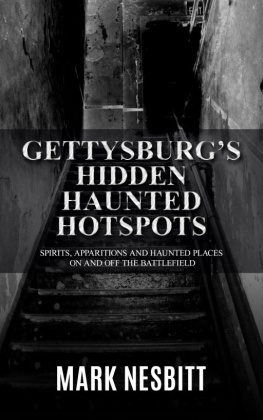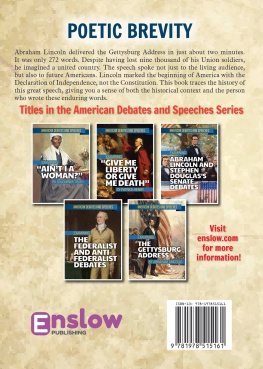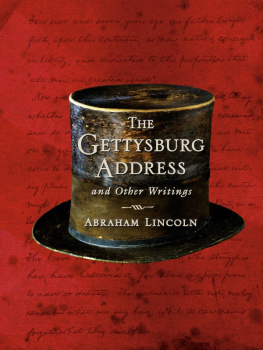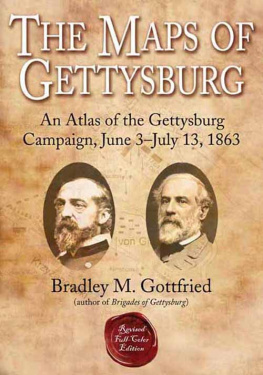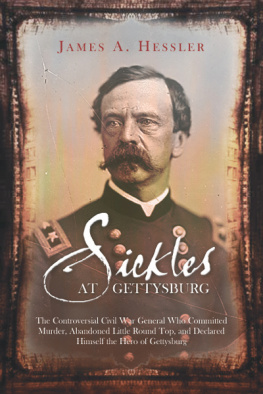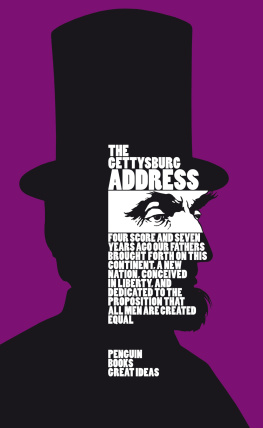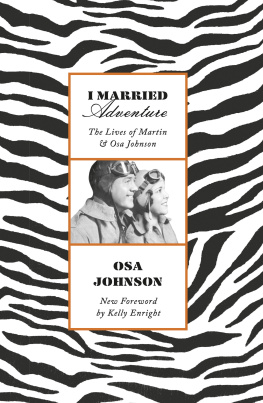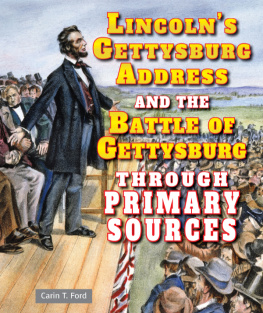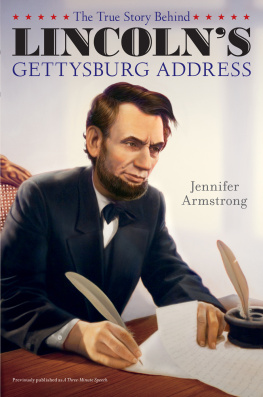WRITING THE GETTYSBURG
ADDRESS
Writing
THE
Gettysburg
Address
Martin P. Johnson
2013 by the University Press of Kansas
All rights reserved
Published by the University Press of Kansas (Lawrence, Kansas
66045), which was organized by the Kansas Board of Regents and is
operated and funded by Emporia State University, Fort Hays State
University, Kansas State University, Pittsburg State University,
the University of Kansas, and Wichita State University
Library of Congress Cataloging-in-Publication Data
Johnson, Martin P.
Writing the Gettysburg Address / Martin P. Johnson
pages cm
Includes bibliographical references and index.
ISBN 978-0-7006-1933-7 (hardback)
ISBN 978-0-7006-2064-7 (ebook)
1. Lincoln, Abraham, 18091865. Gettysburg address. 2. Lincoln,
Abraham, 18091865Political and social views. I. Title.
E475.55.J65 2013
973.7'349dc23
2013020162
British Library Cataloguing-in-Publication Data is available.
Printed in the United States of America
10 9 8 7 6 5 4 3 2 1
The paper used in this publication meets the minimum requirements
of the American National Standard for Permanence of Paper for
Printed Library Materials Z39.48-1992.
For Kelli
Contents
A photo section appears following .
Acknowledgments
This project began when I, like many before me, became intrigued and puzzled by the mysteries of the Gettysburg Address. It seemed odd that the origins and writing of a speech that had become such an important part of American identity should be surrounded by so many questions. Early on, it became clear that much of the confusion arose from the encrustation of error accumulated over the decades, of stories repeated but never verified, and of supposedly eyewitness accounts by persons who were merely reporting what they thought others had said. Then the task became a matter of seeking the earliest and most reliable evidence and putting the fragmented history of the events together with the silent testimony of the texts. I was astonished at the story I discovered of Lincolns own understanding of the eventful journey that brought him to create a speech he knew to be remarkable, and I hope that this history of Lincolns journey to the new birth of freedom helps reveal a new depth to Americas most admired speech and to its most beloved president.
I am deeply thankful to the many friends and colleagues whose help and advice has been invaluable during this project. Research support was provided by the Department of History, the College of Arts and Sciences, and the Office of the Provost at Miami University. In addition, I would like to thank the legion of archivists and librarians who were unstinting with their time and efforts, among them Mary Jo Kline and Mario Fernandez for their help with the John M. Hay Papers at the John M. Hay Library, Brown University; Katherine Reagan and Lucy Burgess at the Carl A. Kroch Library Rare and Manuscript Collections, Cornell University; Patty Mosher of the Galesburg (Illinois) Public Library; Karen Dupell Drickamer of the Musselman Library, Gettysburg College; John Rhodehamel at the Huntington Library in San Marino, California; Thomas Schwartz of the Illinois State Historical Society, Springfield, Illinois; William Grace at the Kansas State Historical Society, Topeka; Matt Norman for his help with the Clark E. Carr Papers at the Knox College Archives in Galesburg, Illinois; Ilhan Citak for his help with the John R. Bartlett Papers at the Linderman Library, Lehigh University; Cindy VanHorn of the former Lincoln Museum in Fort Wayne, Indiana; Steve Nielson for his help with the Alexander Ramsey Papers, Minnesota State Historical Society; Nicholas Graham for his help with the Edward Everett Papers, Massachusetts State Historical Society; Maida Goodwin for her help with the Hale Family Papers, Smith College, Northampton, Massachusetts; Mary H. Huth for her help with the William H. Seward Papers, University of Rochester Library, Rochester, New York; and Lila Fourhman-Shaull at the York County Heritage Trust, York, Pennsylvania.
WRITING THE GETTYSBURG
ADDRESS
Introduction:
The Mysteries of the
Manuscripts
A brilliant November day. Ten thousand mourners wait. He rises.
The throng of eager listeners was swayed by his stirring words. Their hearts swelled with deeper emotions as the speaker poured out the fervor of his own patriotic soul, always in full sympathy with the brave defenders of the country, over the nameless graves which consecrated that field of blood.
The world will little note, nor long remember, what we say here; but it can never forget what they did here.
Noble words of a true-hearted patriot! Such honor to the brave does not often hallow their sleeping dust.... His generous nature clasped the lifeless forms of those who saved their country by nobly sacrificing themselves; and he would recognize the obligations of the living to the martyred dead.
Lincoln at Gettysburg. Few images of the American past run deeper in the national memory than that of the tall martyr president dedicating the cemetery for the honored dead of the greatest battle of the Civil War. But in our postheroic era, depictions like this one, published by William Makepeace Thayer less than a year after the ceremonyeven before Lincoln was reelectedseem irretrievably remote. It may be that the iconic scenes and
No area of that realm has been more unprofitable than the quest to know how Lincoln wrote and revised the Gettysburg Address. Some of the first newspaper articles about the Gettysburg dedication ceremony, 150 years ago, noted that Lincolns words were reported inaccurately, and the 1870s saw the first debate about which of the handwritten copies of the speech he may have held while speaking; to the present these questions have remained unanswered. These mysteries of the manuscripts are important because the search for a secure history of Lincolns best-known speech is at heart an effort to understand his ideas and purposes at a crucial moment in the war, for there is no more effective way to enter into peoples thinking than to look over their shoulder as they compose and revise. It is in the spaces between words, in the differences and choices made between one sentence or phrase and another, that we approach most closely the enigma of creativity and thought. Yet for the Gettysburg Address, confusion and uncertainty about such fundamental issues as which of the five handwritten versions Lincoln wrote first, which manuscript was the oneif anyhe read from at the ceremony, and which report of his words is most reliable have prevented comprehensive analysis of Lincolns vision and a clear sense of the evolution of his thought as he wrote and spoke about the central issues of the great Civil War and the nature of the American experiment.
Many of the mysteries of the manuscripts arise because, although the Gettysburg Address is the most admired work by our most admired president, the dramatic and surprising story of Lincolns speech has never been fully told.to compose his words in Washington with one set of ideas, incorporated in the draft of the speech that he took with him when he left the White House. Yet by the time Lincoln stood on the platform at Gettysburg a day later, he had traveled a long road, one that had become more meaningful with each step. He had journeyed by carriage, train, and horseback, passing in part over familiar terrain that he now saw in a new light. He had experienced for the first time the battlefield of Gettysburg and the little town in the grip of patriotic celebration of loyalty and commemoration. And he had deeply felt the solemn funeral rites for 3,000 heroes and more.







